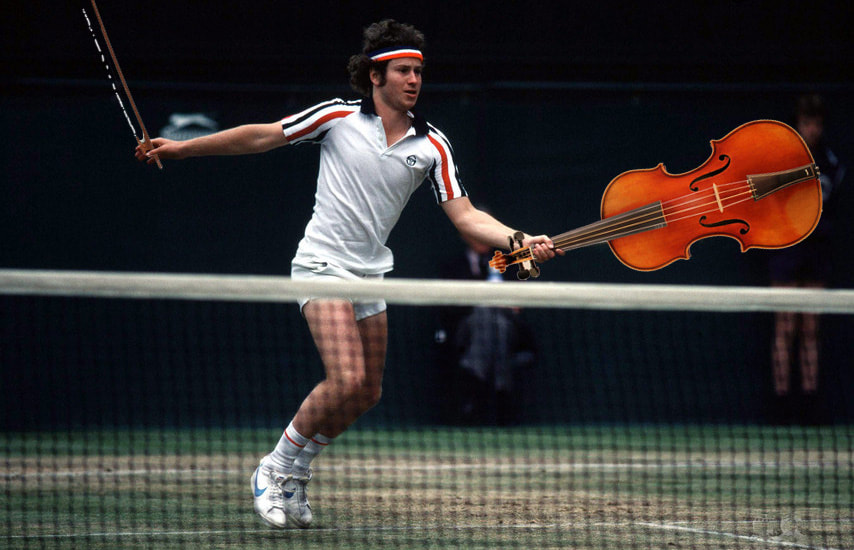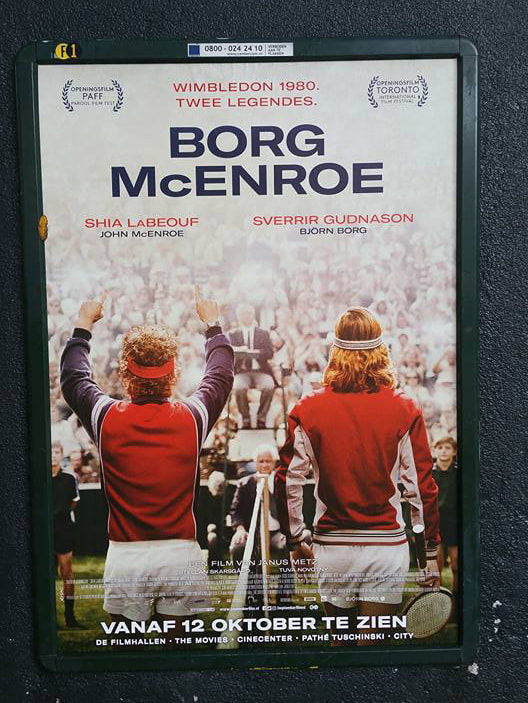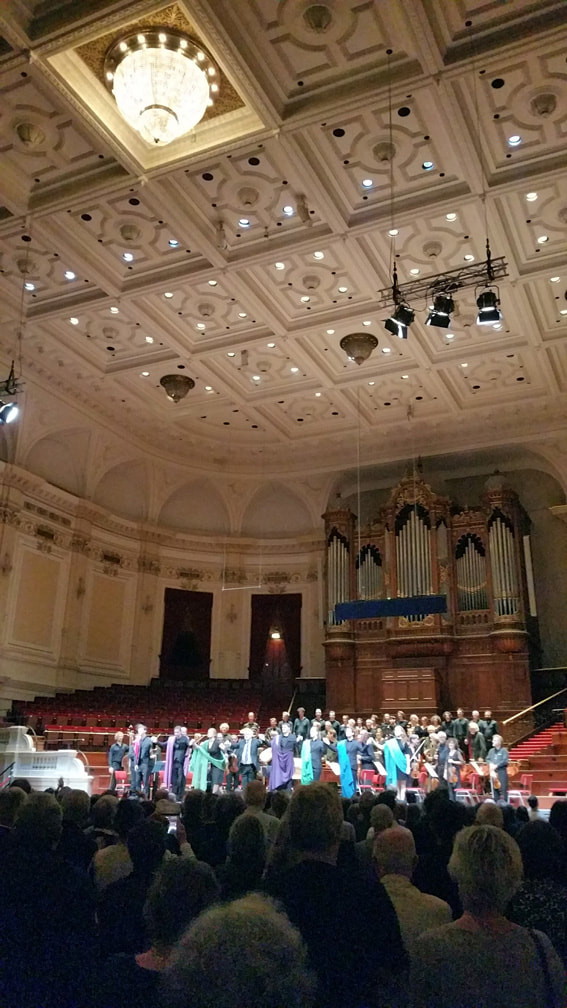La Clemenza di Tito in the Amsterdam Concertgebouw and the Wimbedon final of 1980. About King's dramas with historical instruments and wooden rackets. He didn't want respect to be synonymous with fear. More than the end of his reign, he feared the day that people would only accept him as their emperor because they were afraid of him. The time when the populace no longer accepted leaders for which they didn't have to be afraid was over. Mozart granted this emperor with very beautiful music, as a support for those who want to see the development of human civilization drawn with an ascending line. Emperor Titus was an example of self-reliance. However, many of his successors would not care much for the ideals to which he adhered. And perhaps it was because of one of those successors, Eliogabalo - who resided on the other side of the Amstel River (with the Dutch National Opera) on the same night Titus was in town - why La Clemenza di Tito in the Concertgebouw was far from sold out on 18 October. It was the weeks of the king's drama. A period that started with Eliogabalo by Cavalli, followed by Mozart's La Clemenza di Tito and ended with a film about a tennis match. Tennis match? I didn't know who Shakespeare was, but the drama of the king who had to face the rebellion was made palpable by its performers Björn Borg and John McEnroe as only a few films or theaterplays managed to do since. By playing one of the best tennis matches ever, King Borg and rebel McEnroe made the Wimbledon final from 1980 an experience that awakened the feeling in me that there can't be drama without beauty. The natural need for drama, the need we satisfy by watching movies, listening to music and all, comes with the yearning for the beauty without which that drama could not exist, wouldn't have an impact on us. I look at the footage of this final again and regret that there is – like in classical music – no such thing as a Historical Informed Performance practice in tennis. Tennis with wooden rackets from an era before oversized composite rackets tipped the balance between power and technique in favor of power and changed the outlook of the sport forever - with disastrous results. (Tennis as a spectactor's sport is dead, a match without Federer is not worth watching.) As a game to watch, tennis from 1980 is an art form that pleads for a return to the rackets of old days. Back to the time when technique prevailed and each player had its own distinctive style. In the history of the sport, there probably never was a player who played so purely on technique as John McEnroe. Despite his - by times - incomprehensible behaviour on the court, he would be the keeper of the flame for some time in the era that followed when the hard-hitters entered the scene. But also he would eventually be blown away by players who did not yet have a fraction of his feeling for the ball. (I guess it's Ivan Lendl's fault after all.) I heard the orchestra before, they played symphonies by Joseph Haydn. The year prior, founder and conductor Frans Brüggen had passed away and they played the symphonies - in his honor - without a conductor. On instruments from the 18th century - or replicas – they delivered a Sturm und Drang-kind of performance that was very much in the here and now and kept the music far away from a tour in the museum. With the The Orchestra of the Eighteenth Century it was as if your favourite band was in town. It was music to take to the proverbial desert island. Music that will prevent you from going numb when you are completely on your own. With a wooden racket stringed with gut – a worthy tool for a mighty job - King Borg beats down the revolt of rebel McEnroe. A temporary victory it is because the fight breaks something inside of him. With this heavily fought victory the king realises that the end of his reign is near. Also for Borg the insight sinks in that the time in which a person is immortal – may imagine himself to be invincible – is a limited one. One year later Borg retreated from the game, burned-out and yearning for anonymity. I had to find another idol. How unhappy is the fate of those who reign! To us is denied what is given to the lowliest. That needy peasant [...] sleeps peacefully, passes his days in tranquillity. (Tito) In La Clemenza di Tito, Mozart shows himself in addition to a composer of very beautiful music, a great connoisseur of the human psyche. He keeps all aspects of the story and its characters neatly in place. All personages are allowed to show themselves in all their strength and weakness. They keep their appetite for drama within reasonable limits. In Deirdre Angenent's Vitellia that drama tends too much towards extremes. (She wants Titus to marry her but co-instigates the revolt against him when that wish remains – initially – unfulfilled.) It was like Angenent was trying, especially in the first act, to emphasize something that doesn't need any further explanation. The music that Mozart provided for Vitellia can do very well without the schrieks in the higher register that suggest that volume should be synonymous with drama. The latter is exactly what this production - with the orchestra, their choice for authentical instruments and a semi-staging - refutes so successfully. Mozart and his last opera don't need large gestures and excessive resources to be enthralling. Mozart had about six months to live when he accepted the assignment for La Clemenza di Tito. Death, though he may not have suspected it himself, was on his trail. For the recitatives, his student Süssmeyr was called upon to help him and the maestro himself came up (as always) with some of his most beautiful arias. The roles for castrate singers, dating back to Mozart's time, are nowadays sung by mezzosopranes. A conversion that – from a dramatic point of view – does not always turn out to be without problems. It worked well here, perhaps because of the semi-staging in which you tend to take the image you see less literally - more as an abstract representation of things than with a full staging. In the Sixtus of mezzo-soprano Paula Murrihy, Tito's best friend who initiates the rebellion, the conflicting emotions of someone who betrays his best friend are easily perceptible. Murrihy sings a brave Sixtus who, despite the betrayal that he commits, was a little bit the hero of the evening for me. Conductor Kenneth Montgomery kept the fire burning in Mozart's last opera. Sitting behind a harpsichord to accompany the recitiatives, he kept everyone involved and on edge. At no time did this opera feel like a rush job. (Mozart took the commission to compose "Tito" because he needed the money - he completed it in about three months). In the capable hands of The Orchestra of the Eighteenth Century, this intermediate dish – Mozart was occupied with the premiere of Der Zauberflöte whilst composing it – turned out to be a copious diner. At no time did the attention or flow dropped. I prefer this Tito to Der Zauberflöte – an opera I didn't manage to fall in love with yet. In this production La Clemenza di Tito wasn't necessarily a plea for an opera that isn't among Mozart's favorites (like the Da Ponte operas and Der Zauberflöte) but made its case, in all its excellence, completely selfevident. Reducing a possible question "Why stage Tito?" to a silly one. If Anders Dahlin's Titus might have been a little light of voice - it was not in complete contradiction with his benevolent, you could say, soft character - with Laetitia Gerards as a delicate Servilia and Henk Neven as a powerful Publio, the vocal line-up was far above average. In Jeroen Lopes Cardozo's direction, the master showed himself in his simplicity. For instance; the fire in the Capitol (during the revolt) was depicted with a red light on stage with figurants running into the hall, mingling with the audience. No need to bother for more, it was as basic as it was convincing. To commit yourself to doing good and, ultimately, forgive those who betrayed you. It is - by my knowledge - rarely seen in the world of opera. Titus does so, and therefore he rises far above the majority of the personages that usually populate the genre. It made him a bright star in days that are quickly growing darker. He came, saw and conquered. Orchestra of the Eighteenth Century
Capella Amsterdam Kenneth Montgomery - conductor Jeroen Lopes Cardozo - direction Anders Dahlin - Titus Paula Murrihy - Sixtus Deirdre Angenent - Vitellia Laetitia Gerards - Servilia Rosanne van Sandwijk - Annio Henk Neven - Publio
0 Comments
Leave a Reply. |
TIMELINE
July 2024
|




 RSS Feed
RSS Feed